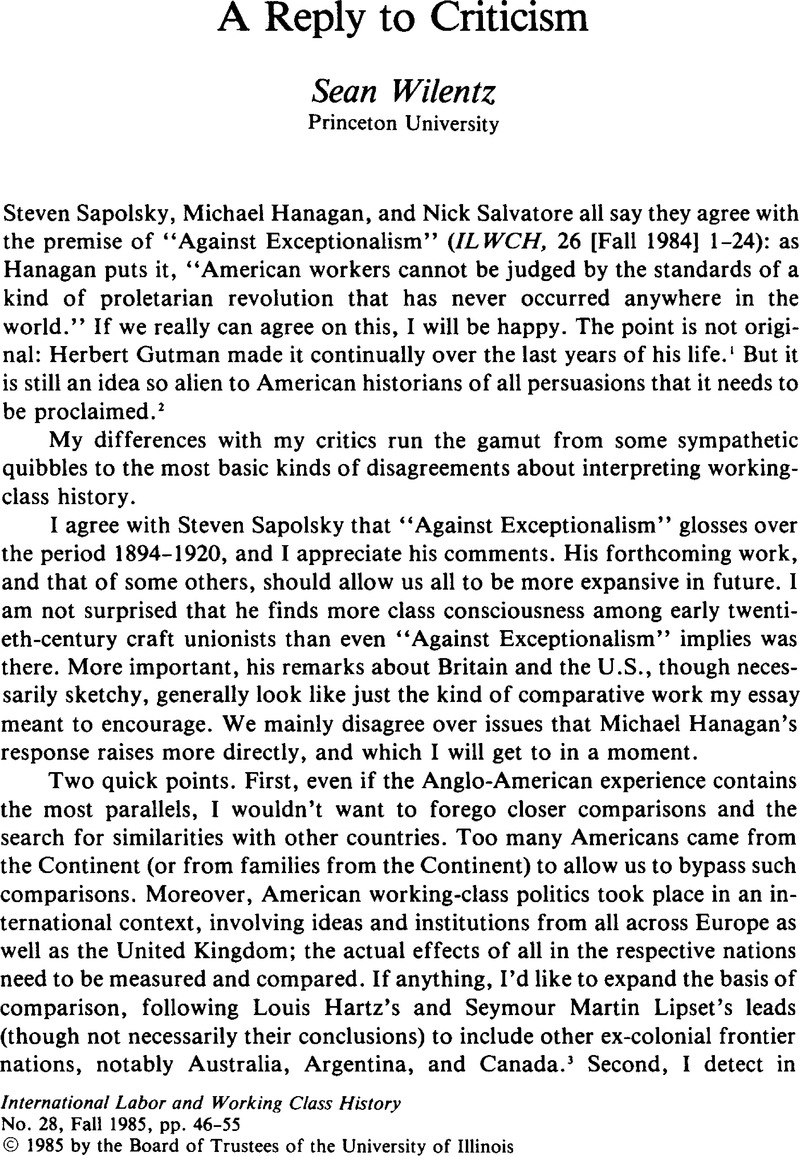No CrossRef data available.
Article contents
A Reply to Criticism
Published online by Cambridge University Press: 16 December 2008
Abstract

- Type
- Responses to Contoversy
- Information
- Copyright
- Copyright © International Labor and Working-Class History, Inc. 1985
References
NOTES
1. See especially Michael Merrill's interview with Gutman, in MARHO Visions of History (New York, 1983), 199–203.Google Scholar
2. One liberal historian's recent programmatic critique of current historical writing beautifully (if unintentionally) shows how alien the idea remains; Diggins, John Patrick“Comrades and Citizens: New Mythologies in American Historiography”, American Historical Review, 90 (1985): 614–38.CrossRefGoogle Scholar Diggins complains, among other things, that the “new” labor historians have failed to document what he calls “the Marxist idea of class consciousness” among American workers-as if that were the matter at issue.
3. Hartz, LouisThe Founding of New Societies (New York, 1964)Google Scholar; Lipset, Seymour MartinAgrarian Socialism (New York, 1950)Google Scholar; idem., The First New Nation: The United States in Historical and Comparative Perspective (New York, 1963)Google Scholar. The U.S.-Canada comparison has already been made afresh by Palmer, Bryan D., “Social Formation and Class Formation in North America, 1800–1900” (paper delivered to the Proletarianization Past and Present Conference, Rutgers University, New Brunswick, N.J., 04 1983).Google Scholar
4. See, above all, Schorske, Carl E.German Social Democracy, 1905–1917 (Cambridge, Mass., 1952)Google Scholar; Hunt, R. N., German Social Democracy, 1918–1933 (New Haven, 1964).Google Scholar
5. American Citizen[New York]11 9 1801Google ScholarSalvatore uncritically accepts Howard B. Rock's ascription of a “free enterprise ideology” to the bakers, and then construes that this was out of step with the bakers' “democratic” “anti-elitist” tendencies. Yet even Rock points out that “the bakers' /anti-assize] offensive was directed against the elite classes,” Artisans of the New Republic: The Tradesmen of New York City in the Age of Jefferson (New York, 1979), 189Google Scholar Nothing in the material Rock cites shows the bakers to have been bourgeois free-market ideologues. Notably, the supposedly “free enterprise” bakers raised no objection to city regulation of the size and weight of loaves, which they allowed was a necessary safeguard of the public good.
6. Something like such a discussion of medieval England actually appeared recently only to be met with devastating criticism: MacFarlane, Alan, The Origins of English Individualism (Oxford, 1978)Google Scholar. For correctives on the supposed equivalence of late-eighteenth- and early-nineteenth century small-producer outlooks and “free enterprise,” see Winch, Donald, Adam Smith's Politics: An Essay in Historiographic Revision (Cambridge, 1978)CrossRefGoogle Scholar, and Hont, IstvanIg-natieff, Michael, Wealth and Virtue (Cambridge, 1984)Google Scholar. On the United States, see Gary J. Kornblith and John M. Murrin, “Class and the Language of Class in Colonial and Revolutionary America” (paper presented to the Comparative Social History Conference, Institute of Early American History and Culture, Williamsburg, VA, September 1985), especially 39–61 passim.
7. Herbert Gutman, in Visions of History, 191
8. Montgomery, David “Labor in the Industrial Era”, in Morris, Richard B., ed., The American Worker (Washington, D.C., 1976), 126.Google Scholar
9. For quotations, and on McDonnell generally, see Gutman, Herbert G., “A Brief Postscript: Class, Status, and the Gilded Age Radical: A Reconsideration”, in Work, Culture, and Society in Industrializing America (New York, 1976), 260–92.Google Scholar
10. Karl Liebknecht and Rosa Luxemburg. In this connection, one might also note that of all socialist parties apart from the Bolsheviks, only the American and the Italian truly adhered to socialist internationalism by refusing from the start to back the imperialists' war. Yet somehow we rarely hear the argument that the American SP was more “socialist” than most of its European counterparts.
11. See the classic account by Rosenberg, Arthur, A History of the German Republic (London, 1936).Google Scholar
12. This is a peculiar image. Given Hartz's reliance on Tocqueville, the two might best be thought of as lenses at the opposite ends of the same telescope. And, given who relied on whom, Salvatore would have us look through the scope out the wrong end.
13. Thomas Hart Benton to Martin Van Buren, June 16, 30, September 11, 25, 1851, Van Buren Papers, Library of Congress.
14. de Tocqueville, Alexis, Democracy in America, trans. Reeve, Henry, ed. Bradley, Phillips (New York, 1954), II, 169Google Scholar. See also ibid., II, 199–201.


